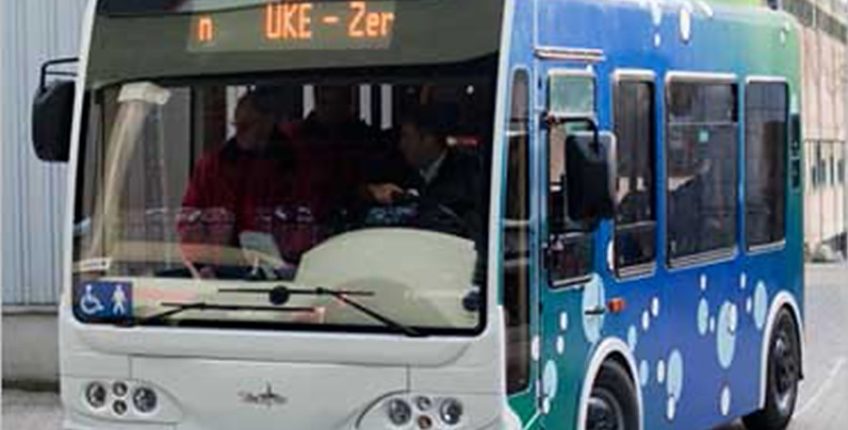The transport sector in Germany is characterised by sustained growth and increasing CO2, NOx and soot particle emissions. The swift implementation of low emission drives such as the fuel cell as well as hydrogen as a very promising energy storage medium is therefore of major importance. On this backdrop, buses have the advantage that they are deployed daily and generally for significantly more operational hours than a passenger car.
For this reason, they are particularly suitable for testing hydrogen and fuel cell technology in practice and identifying the areas still requiring optimisation to subsequently develop the vehicles towards market maturity.
The project aimed to test a fuel cell midibus from Hydrogenics on the grounds of the University Medical Center Hamburg-Eppendorf. Klinik Logistik Eppendorf deployed the bus on its circle line on which visitors, patients and students could reach the clinic’s various facilities and centres. Goal of the project was to establish the suitability of such a vehicle under everyday conditions across seasons and assorted operational demands. The establishment of a small, mobile refuelling facility and the corresponding interfaces complemented the testing of the fuel cell bus.
Besides having an electric motor and fuel cell as primary energy sources, the hybrid midibus also includes an additional battery unit to cover peak loads. An integrated energy management system controls the selection of the appropriate source of energy and the required power level. This operates autonomously without the need of any input from the driver. Through the recovery of braking energy (recuperation), the battery is recharged and the consumption of hydrogen is reduced. With slight seasonal variations, the fuel consumption is approx. 3 kg of hydrogen per 100 km.
Over the course of the project period, the fuel cell midibus travelled a total of 14,600 km and conveyed around 16,000 passengers around the clinic grounds in scheduled operation. Seasonal restrictions to operations in terms of the midibus’ technical availability were not recorded throughout the project. Due to the early definition of interfaces for the refuelling facility, refuelling procedures were also completed without a hitch.
The fuel cell midibus project can be considered an overall success. The bus and integrated drive concept could completely meet the operational and technical demands for deployment by Klinik Logistik Eppendorf. As such, this project represents a reference for the implementation of fuel cell hybrid systems in midibuses for future areas of application in regular or shuttle transport services.
Funding Code
03BV209
| Partner | Start of term | End of term | Funding amount |
| KLE Klinik Logistik & Engineering GmbH | 01.07.09 | 31.12.13 | 311,699.41 € |
| hySOLUTIONS GmbH | 01.07.09 | 31.12.13 | 4,801.64 € |
| 316,501.05 € |

